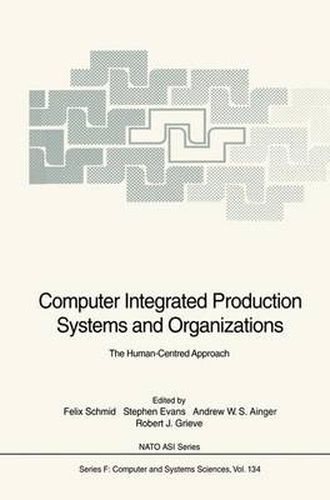Readings Newsletter
Become a Readings Member to make your shopping experience even easier.
Sign in or sign up for free!
You’re not far away from qualifying for FREE standard shipping within Australia
You’ve qualified for FREE standard shipping within Australia
The cart is loading…






This title is printed to order. This book may have been self-published. If so, we cannot guarantee the quality of the content. In the main most books will have gone through the editing process however some may not. We therefore suggest that you be aware of this before ordering this book. If in doubt check either the author or publisher’s details as we are unable to accept any returns unless they are faulty. Please contact us if you have any questions.
The Background to the Institute The NATO Advanced Study Institute (ASI) ‘People and Computers - Applying an Anthropocentric Approach to Integrated Production Systems and Organisations’ came about after the distribution of a NATO fact sheet to BruneI University, which described the funding of ASls. The ‘embryonic’ director of the ASI brought this opportunity to the attention of the group of people, (some at BruneI and some from outside), who were together responsible for the teaching and management of the course in Computer Integrated Manufacturing (CIM) in BruneI’s Department of Manufacturing and Engineering Systems. This course had been conceived in 1986 and was envisaged as a vehicle for teaching manufacturing engineering students the technology of information integration through project work. While the original idea of the course had also included the organisational aspects of CIM, the human factors questions were not considered. This shortcoming was recognised and the trial run of the course in 1988 contained some lectures on ‘people’ issues. The course team were therefore well prepared and keen to explore the People, Organisation and Technology (POT) aspects of computer integration, as applied to industrial production. A context was proposed which would allow the inclusion of people from many different backgrounds and which would open up time and space for reflection. The proposal to organise a NATO ASI was therefore welcomed by all concerned.
$9.00 standard shipping within Australia
FREE standard shipping within Australia for orders over $100.00
Express & International shipping calculated at checkout
This title is printed to order. This book may have been self-published. If so, we cannot guarantee the quality of the content. In the main most books will have gone through the editing process however some may not. We therefore suggest that you be aware of this before ordering this book. If in doubt check either the author or publisher’s details as we are unable to accept any returns unless they are faulty. Please contact us if you have any questions.
The Background to the Institute The NATO Advanced Study Institute (ASI) ‘People and Computers - Applying an Anthropocentric Approach to Integrated Production Systems and Organisations’ came about after the distribution of a NATO fact sheet to BruneI University, which described the funding of ASls. The ‘embryonic’ director of the ASI brought this opportunity to the attention of the group of people, (some at BruneI and some from outside), who were together responsible for the teaching and management of the course in Computer Integrated Manufacturing (CIM) in BruneI’s Department of Manufacturing and Engineering Systems. This course had been conceived in 1986 and was envisaged as a vehicle for teaching manufacturing engineering students the technology of information integration through project work. While the original idea of the course had also included the organisational aspects of CIM, the human factors questions were not considered. This shortcoming was recognised and the trial run of the course in 1988 contained some lectures on ‘people’ issues. The course team were therefore well prepared and keen to explore the People, Organisation and Technology (POT) aspects of computer integration, as applied to industrial production. A context was proposed which would allow the inclusion of people from many different backgrounds and which would open up time and space for reflection. The proposal to organise a NATO ASI was therefore welcomed by all concerned.